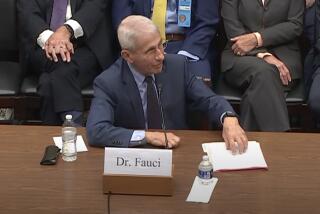Column: The Zika disaster will test the GOPâs capacity to manage serious healthcare emergencies
The Zika crisis, which seems to have faded from memory since it became a big news item this summer, has roared back with a vengeance, thanks to a just-published study indicating that the virusâ effect on infants of women infected during pregnancy is much worse than previously known.
The study, published in the New England Journal of Medicine, found that 42% of infants infected in the womb had serious birth defects. Previously, attention focused on an outbreak of microcephaly among infected babies, but that turns out to be merely the tip of the iceberg, appearing in 3% of the newborns. The other conditions included serious neurological defects leading to seizures, âvisual and hearing impairment, spasticity, contracted limbs, and difficulty swallowing and feeding,â the study found. The study covered 117 live infants born to 116 Zika-infected mothers in Brazil.
Funding erosion is intrinsic to the block grant structure.
— Center on Budget and Policy Priorities
âI actually donât think thereâs anything more harmful to a fetus than Zika,â Karin Nielsen-Saines, a UCLA pediatric expert and the senior author of the new study, told the Stat medical news service.
The public health implications of this finding are dire for the United States, where congressional Republicans treated Zika funding this year as an opportunity to give big business a handout and to score ideological points on womenâs reproductive health. For one thing, the zone of maximal Zika infection in the United States is Florida, an epicenter of GOP representation. Some 99% of locally-acquired infections occurred in Florida, which also had 18% of cases in which the infection was brought in by visitors from abroad. Texas had 6% of the latter. Other states with large traveler-borne infections were California (9%) and New York (21%). The biggest outbreak of locally-acquired infection was in Puerto Rico, with an enormous case load of 33,000, but Congress has a long tradition of ignoring the island territory anyway.
Zika is bound to place immense pressure on public health programs that Republicans are determined to gut. Medicaid, which lies in the crosshairs of the congressional GOP majority as well as President-elect Donald Trump, covers about half of all births. As Richard Mayhew, the indispensable health insurance expert at Balloon-juice.com, observes, âtreating and caring for an individual with microcephaly will have a lifetime cost of $10 million dollars.â Treating those with neurological conditions will also be a heavy burden.
How will that square with Republican plans to cut Medicaid by block-granting it to the states? Not well at all. Block grants by their nature lead to shrinking resources over time, because theyâre based on state spending at the time theyâre implemented and seldom revisited when needs change. âFunding erosion is intrinsic to the block grant structure,â the Center on Budget and Policy Priorities reported in a paper last March.
The pattern of Zika infections points to how poorly the block-grant system will serve Zika sufferers across the nation. âLong-run Zika neurological impairments will hit warmer statesâ Medicaid budgets much harder and more disproportionally than Zika will hit cold weather statesâ Medicaid budgets,â says Mayhew. Alaska will have very few cases, while Florida will face billions in costs.
When the bill comes due, Americans should remember that much of it is the result of the cynical gamesmanship of congressional Republicans this year. As I reported, President Obama requested $1.9 billion in Zika funding in February, including money for research into a vaccine. The House and Senate responded with their own funding measures â the Senate at $1.1 billion, the House at $622 million. The House proposal would raid other disease programs to cover the bill.
The House then saddled its measure with a provision to loosen pesticide regulations, ostensibly in the name of fighting Zika, but really to give big business a handout.
Speaker Paul Ryan (R-Wis.), tried to blame Democrats for the resultant delay, asserting that the administration was putting the interests âof environmental interest groups ahead of the public,â adding fatuously, âthe health of the public is at stake.â But the game was exposed by his Senate GOP counterparts, who stuck language into their funding bill that would block funding for ProFamilias, a group that works with Planned Parenthood in Puerto Rico. Majority Leader Mitch McConnell (R-Ky.) refused to remove it, leading to a further deadlock. A clean funding bill finally passed in September, but with only half of what federal agencies needed to combat the outbreak.
It seemed clear that the congressional majority was happy to delay a Zika bill indefinitely because the crisis seemed abstract (except in Puerto Rico and Florida). But if the Brazil results are any indication, the chickens will soon be coming home to roost, and theyâll be long-lived and expensive. Zika will underscore the folly of shortchanging public health and treating political dysfunction as a goal. Now that theyâre in control of the entire government, will Republicans get the message?
Keep up to date with Michael Hiltzik. Follow @hiltzikm on Twitter, see his Facebook page, or email [email protected].
Return to Michael Hiltzikâs blog.







